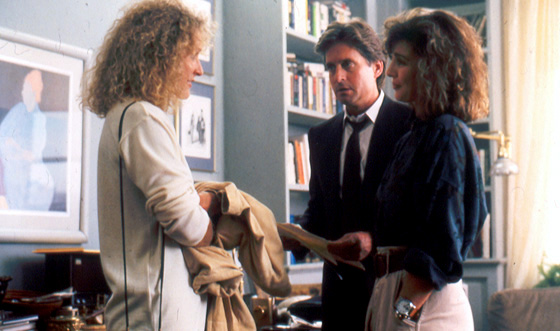Culture
The Bloody Truth: “Fatal Attraction”

Every week, Calhoun Kersten digs back into the endless back catalog of horror cinema in The Bloody Truth.
Fatal Attraction is one of those movies that’s just a little bit too hard to believe. I mean, when you strip it down to its most basic elements, it’s still pretty outrageous and offensive, although coming from director Adrian Lyne this is hardly surprising. I dunno, maybe I never got past the part of the story where Michael Douglas was supposed to be considered both a viable and attractive leading man. Still, let’s take a look at the bare bones of the script.
Dan (Douglas), a married man with a kid at home, has an affair. Shockingly, he isn’t the bad guy. Instead, the attractive young Alex (Glenn Close), the one he had an affair with, goes mad with jealousy. Again, he is totally blameless. She dedicates the rest of the movie to making his life a living hell, boiling his kid’s rabbit and even going so far as to kidnap her. In the end, he tries to kill her, but it’s his dutiful wife who ends up doing the deed. Then they live happily ever after.
Okay, everybody up to speed? The whole “crazed woman” trend in psychological thrillers has become an overused cliché. Basic Instinct, Single White Female, all of it. Furthermore, let’s take a look at the genre; psychological thriller. Yet there’s no attempt to understand these characters psychologically. Instead, what results is an irrational and overly emotional depiction of woman as sexual objects and sinful perpetrators of violence. Why does Alex obsess over Dan? The movie never really makes any attempt to answer this. Instead, director Lyne’s seeming fear of women reaches a violent dénouement in which Alex, the woman, is punished for…well, essentially for being a woman. Dan is never held accountable for his role in seducing and bedding Alex. This isn’t to say that he deserves everything that Alex does to him (although to be fair, Alex targets the women in his life, such as his wife and daughter, more than she antagonizes him), but Lyne seems incapable of allowing Dan to be guilty of, well, anything.
But the thing is- well, Dan is guilty. No, he’s not a bunny boiler, but he’s not innocent. He plays a role in their affair, even if he is the one that breaks it off. Honestly, the character of Dan feels like a male fantasy of, “well, I guess I’m just too hard to get over.” It’s a twisted form of flattery to the male portion of the audience, this idea that a woman could just really lose it for you. Granted, yes, there are mentally unstable women (just as there are men) who develop unhealthy fixations on certain people. Still, none of those real life instances are painted with such one-sidedness as Fatal Attraction.
Hell, even in the final moments, Dan escapes culpability and has a woman do the dirty work. While he tries to kill Alex by drowning her, it is his wife that ends up shooting and killing Alex. Lyne said in the commentary that it was decided to have his wife shoot Alex because it juxtaposed the two characters. Alex was now the victim. Again, Dan, who has a defined role in this dynamic, completely escapes wrongdoing. He isn’t even reprimanded for his indiscretion or straying from his wife. Instead, the finale suggests that the whole experience has brought the family unit closer together.
What Fatal Attraction leaves it audience with is a twisted portrayal of an almost pathological fear of women. Alex is the most obvious example of this phobia. She uses her wiles to destroy a man’s home life and she uses her femininity aggressively in her attempts to destroy the other women in Dan’s life. While the reality of the complexity of these dynamics is crucial to the psychological thriller, it is glossed over in Fatal Attraction.